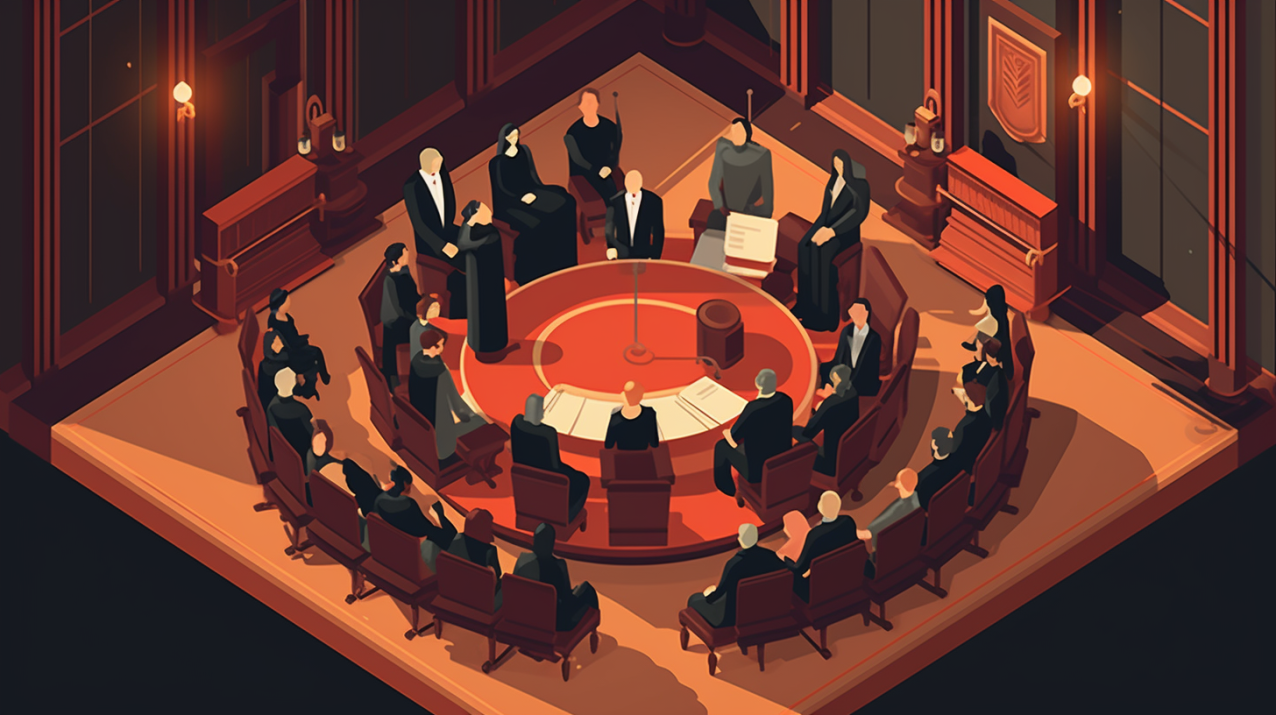Franchise Disclosure Laws
If you've ever considered investing in a franchise, it's crucial that you understand the ins and outs of franchise disclosure laws. These laws are designed to protect potential franchisees like yourself by ensuring transparency and providing vital information about the franchisor and the opportunity at hand. In this article, we'll delve into the purpose of franchise disclosure laws, explore key components of a franchise disclosure document, discuss your rights and protections as a franchisee, evaluate how these laws impact the industry as a whole, and help you make an informed decision about whether a particular franchise opportunity is viable for you.
Imagine embarking on a new business venture without any knowledge or understanding of what lies ahead. It would be like sailing into uncharted waters without a compass or map. That's where franchise disclosure laws come in – they act as your guiding light, illuminating critical aspects of the franchisor-franchisee relationship before you commit to anything. By requiring franchisors to disclose essential information about their business operations, financials, litigation history, and more, these laws ensure that you have all the necessary details to make an informed decision.
In the following paragraphs, we will break down each aspect of franchise disclosure laws so that you can navigate through this complex terrain with confidence. From understanding what goes into a comprehensive Franchise Disclosure Document (FDD) to exploring your rights and protections under these laws, we will leave no stone unturned in equipping you with the knowledge needed to assess the viability of any given franchise opportunity. So let's dive in and unravel the intricacies of franchise disclosure laws together!
Key Takeaways
- Franchise disclosure laws aim to promote transparency and fairness in the franchising industry by requiring franchisors to disclose essential information about their business operations, financials, litigation history, and more.
- These laws protect potential franchisees by empowering them to evaluate the risks and benefits associated with a franchise opportunity and preventing them from making uninformed decisions or falling victim to fraudulent practices.
- Franchise disclosure laws serve as a safeguard for both franchisees and franchisors, preventing future legal disputes and ensuring that both parties are aware of their rights and obligations.
- Understanding franchisee rights and protections, as well as carefully reviewing the franchise disclosure document, is crucial before entering into a franchise agreement to gain insights into the franchise system and evaluate its viability.
The Purpose of Franchise Disclosure Laws
If you're considering starting a franchise, you'll want to understand the purpose of franchise disclosure laws and how they can protect your investment. Franchise disclosure laws are regulations put in place to ensure that franchisors provide potential franchisees with all the necessary information about their business before entering into an agreement. These laws aim to promote transparency and fairness in the franchising industry by requiring franchisors to disclose key details about their company, such as financial statements, litigation history, and any fees or restrictions that may apply.
The main purpose of franchise disclosure laws is to protect prospective franchisees from making uninformed decisions and falling victim to fraudulent or deceptive practices. By providing comprehensive information upfront, these laws allow potential investors to thoroughly evaluate the risks and benefits associated with a particular franchise opportunity. This empowers them to make informed decisions based on accurate knowledge of the business model, financial health of the franchisor, and any potential legal issues that may have arisen in the past.
Franchise disclosure laws also serve as a safeguard for both parties involved in a franchise agreement. While they primarily benefit potential franchisees by ensuring they have access to critical information before investing their hard-earned money, these laws also protect franchisors from future legal disputes. By mandating full disclosure of relevant details, such as earnings claims or ongoing obligations between the parties, franchisors can avoid accusations of hiding important information later on.
Franchise disclosure laws play a crucial role in protecting both prospective franchisees and franchisors alike. They promote transparency within the industry by requiring detailed disclosures that empower individuals considering franchises with essential knowledge about the opportunity at hand. Understanding these laws is vital when deciding whether or not to invest in a particular franchise opportunity. Now let's delve into key components of a franchise disclosure document without delay
Key Components of a Franchise Disclosure Document
One important thing to note about the franchise disclosure document is that it contains key components that potential franchisees should be aware of. This document is crucial in helping franchisees make informed decisions before entering into a franchise agreement. Here are three key components you can expect to find in a franchise disclosure document:
-
Franchisor Information: The document will provide detailed information about the franchisor, including their name, address, and contact information. It will also outline the history and experience of the franchisor, as well as any litigation or bankruptcy involving them. This section helps potential franchisees understand who they will be working with and assess the credibility and stability of the franchisor.
-
Franchisee Obligations: The franchise disclosure document will outline the obligations and responsibilities of the franchisee. This includes requirements for initial investment, ongoing fees, royalties, advertising contributions, and other financial obligations. It will also detail any restrictions on products or services offered by the franchisee. Understanding these obligations is essential for potential franchisees to assess whether they can meet them before entering into a contract.
-
Financial Performance Representations: Another important component of the document is financial performance representations or earnings claims made by the franchisor. This section provides information on past performance results of other franchises within the system (if available). It may include data on average sales figures, profit margins, expenses, or other financial metrics relevant to assessing potential profitability. However, it's important to note that not all franchisors are required by law to provide this information.
Understanding these key components of a franchise disclosure document allows potential franchisees to thoroughly evaluate a franchisor's offering before making a decision. By carefully reviewing this document, individuals can gain insights into their rights and obligations as future business owners within a specific system.
Now that you have an understanding of what goes into a franchise disclosure document, let's move on to exploring your rights and protections as a prospective franchisee.
Understanding Franchisee Rights and Protections
Get ready to discover the rights and safeguards you have as a potential franchisee. Understanding franchisee rights and protections is crucial when considering entering into a franchise agreement. Franchise disclosure laws are in place to ensure that franchisors provide prospective franchisees with all the necessary information they need to make an informed decision. These laws require franchisors to provide detailed financial information, including any fees or royalties that will be required, as well as information about the background and experience of the franchisor.
One of the key rights that franchisees have is the right to receive a Franchise Disclosure Document (FDD) from the franchisor. This document contains important information about the franchise opportunity, including details about initial investment costs, ongoing fees, training and support provided by the franchisor, and any restrictions or limitations imposed by the franchisor. By reviewing this document thoroughly, prospective franchisees can gain valuable insights into what it would be like to operate as part of a particular franchise system.
Franchisees also have certain legal protections under franchise disclosure laws. For example, these laws typically prohibit franchisors from making false or misleading statements during the sales process. Franchisors are also required to disclose any litigation history or bankruptcy filings they may have had in the past. Additionally, some states have specific regulations in place regarding termination or non-renewal of a franchise agreement, which can provide additional protection for franchisees.
Understanding your rights and protections as a potential franchisee is essential before entering into any agreements with a franchisor. By familiarizing yourself with relevant laws and regulations surrounding franchises, you can better evaluate whether a particular opportunity is suitable for you. In our next section on evaluating the viability of a franchise opportunity, we will explore some key factors that should be considered before making your final decision.
Evaluating the Viability of a Franchise Opportunity
Before jumping into a potential franchise opportunity, you should take a closer look at whether it's worth pursuing by evaluating its profitability and long-term sustainability. Evaluating the viability of a franchise opportunity involves considering various factors such as the initial investment required, ongoing fees and royalties, and the potential for return on investment. It is important to carefully review the franchise disclosure laws in your jurisdiction to ensure that you have access to all relevant information about the franchise system.
One key aspect to assess when evaluating a franchise opportunity is the financial performance of existing franchisees within the system. Franchise agreements typically require franchisors to provide prospective franchisees with information about average sales figures, net profits, and other financial metrics. This information can help you gauge whether the business model is profitable and sustainable. Additionally, consider conducting independent research on industry trends and market demand for the products or services offered by the franchise.
Another crucial factor to evaluate is the level of support provided by the franchisor. A strong support system can greatly contribute to your success as a franchisee. Look for franchises that offer comprehensive training programs, ongoing assistance with marketing and advertising efforts, operational guidance, and regular communication channels with other members of the franchise network. Assessing these aspects will give you an idea of how well-equipped you will be in running your own business under their brand.
Thoroughly evaluating the viability of a franchise opportunity requires careful consideration of its profitability potential and long-term sustainability. Reviewing financial performance data from existing franchisees along with conducting independent market research can provide valuable insights into these aspects. Additionally, assessing the level of support offered by franchisors will help determine if they are invested in your success as a prospective franchisee. Understanding these factors before making any commitments is essential in ensuring that you choose an opportunity that aligns with your goals and has a high chance of success within relevant legal frameworks like franchise disclosure laws.
Moving forward into 'the impact of franchise disclosure laws on the industry,' it is important to understand how these laws shape the franchise landscape and protect prospective franchisees.
The Impact of Franchise Disclosure Laws on the Industry
Discover how franchise disclosure laws revolutionize the industry, empowering you with essential information to safeguard your investment and make informed decisions. Franchise disclosure laws have had a significant impact on the franchising industry by increasing transparency and accountability. Here are three ways in which these laws have transformed the franchise relationship:
-
Enhanced Consumer Protection: Franchise disclosure laws require franchisors to provide potential franchisees with detailed information about their business model, financial statements, litigation history, and any other relevant details. This enables you to thoroughly evaluate the viability of a franchise opportunity before making a commitment. By having access to this crucial information upfront, you can assess the risks involved and determine if the venture aligns with your financial goals and aspirations.
-
Balanced Power Dynamics: Prior to the implementation of franchise disclosure laws, franchisors held much more power in the relationship with their franchisees. These laws level the playing field by ensuring that both parties have access to essential data needed for decision-making. As a result, franchisors are now compelled to be more transparent in their dealings and provide accurate and comprehensive information about their business operations.
-
Informed Decision-Making: With franchise disclosure laws in place, you can now conduct thorough due diligence before investing your hard-earned money into a particular franchise opportunity. You have access to critical details regarding initial costs, ongoing fees, restrictions on products or services offered, training programs provided by franchisors, territorial rights, termination clauses, and dispute resolution mechanisms among others.
Franchise disclosure laws have had a profound impact on the industry by shifting power dynamics towards greater transparency and accountability between franchisors and potential franchisees like yourself. These regulations enable you to make informed decisions based on comprehensive knowledge about various aspects of a specific franchise opportunity such as its financial health or legal track record. By leveraging this wealth of information provided through these laws, you can safeguard your investment while pursuing entrepreneurial success within the franchising sector ."
Frequently Asked Questions
What are the penalties for failing to comply with franchise disclosure laws?
Failing to comply with franchise disclosure laws can result in various penalties. These penalties are designed to ensure that franchisors adhere to the regulations put in place to protect potential franchisees. The specific penalties may vary depending on the jurisdiction, but they generally include fines and legal consequences. Fines can range from thousands to millions of dollars, depending on the severity of the violation and the number of affected parties. In addition to financial penalties, non-compliant franchisors may also face legal action, which could lead to further financial losses and damage to their reputation. It is important for franchisors to take these laws seriously and fully disclose all relevant information in order to avoid these potentially severe consequences.
Are there any exemptions or exceptions to franchise disclosure laws?
There are exemptions and exceptions to franchise disclosure laws that you should be aware of. While the specifics vary by jurisdiction, some common examples include: small franchises or businesses with a limited number of outlets; certain types of franchises like gas stations or hotels; sales where the total investment is below a certain threshold; transfers between family members or close associates; and franchises that have been in operation for a specified period of time. It's important to note that these exemptions and exceptions are not universal and can differ depending on the specific laws in your jurisdiction. Therefore, it is crucial to thoroughly research and understand the applicable regulations before assuming you are exempt from complying with franchise disclosure laws.
Can a franchisor terminate a franchise agreement without cause?
Yes, a franchisor can terminate a franchise agreement without cause. This means that they have the right to end the agreement for any reason or no reason at all. However, it is important to note that this termination must still comply with any contractual obligations outlined in the franchise agreement. While this may seem unfair or unsettling, it is crucial to remember the old adage "business is business."Franchisors often make these decisions based on various factors such as financial performance, brand integrity, or changes in their business strategy. The termination process typically involves giving notice to the franchisee and providing them with an opportunity to cure any breaches of the agreement before final termination. Additionally, some jurisdictions may require franchisors to provide reasonable compensation in certain situations where termination without cause occurs. It is always advisable for both parties involved in a franchise relationship to thoroughly review and understand the terms and conditions outlined in their franchise agreement before entering into such an arrangement.
Do franchise disclosure laws apply to international franchising?
Franchise disclosure laws do apply to international franchising, so it's important for you to understand the regulations and requirements involved. These laws are designed to protect potential franchisees by ensuring that they receive all the necessary information about the franchise opportunity before making a decision. They typically require franchisors to provide a detailed disclosure document, which includes information such as the franchisor's background, financial statements, litigation history, and other relevant data. This helps prospective franchisees make informed decisions and evaluate the risks and benefits of entering into a franchise agreement. Additionally, these laws often have specific provisions regarding international franchising, such as requiring additional disclosures or registration with local authorities in certain countries. Therefore, if you are considering expanding your franchise internationally or becoming an international franchisee, it is crucial to familiarize yourself with both domestic and foreign franchise disclosure laws to ensure compliance and protect your interests.
Can a franchisee negotiate the terms and conditions of a franchise agreement?
Yes, as a franchisee, you have the opportunity to negotiate the terms and conditions of a franchise agreement. This negotiation process allows you to discuss and potentially modify certain aspects of the agreement that may be more favorable or suitable for your specific needs and circumstances. It is important to thoroughly review the proposed terms and conditions outlined in the initial agreement before entering into any negotiations. During this process, you can raise concerns, propose changes, or request additional provisions that align with your business goals and objectives. Keep in mind that successful negotiation requires effective communication skills, understanding of both parties' interests, and a willingness to compromise when necessary. By actively participating in these negotiations, you can potentially secure a franchise agreement that better meets your requirements while still adhering to the overall framework set by the franchisor.
Areas We Serve
We serve individuals and businesses in the following locations:
Salt Lake City Utah
West Valley City Utah
Provo Utah
West Jordan Utah
Orem Utah
Sandy Utah
Ogden Utah
St. George Utah
Layton Utah
South Jordan Utah
Lehi Utah
Millcreek Utah
Taylorsville Utah
Logan Utah
Murray Utah
Draper Utah
Bountiful Utah
Riverton Utah
Herriman Utah
Spanish Fork Utah
Roy Utah
Pleasant Grove Utah
Kearns Utah
Tooele Utah
Cottonwood Heights Utah
Midvale Utah
Springville Utah
Eagle Mountain Utah
Cedar City Utah
Kaysville Utah
Clearfield Utah
Holladay Utah
American Fork Utah
Syracuse Utah
Saratoga Springs Utah
Magna Utah
Washington Utah
South Salt Lake Utah
Farmington Utah
Clinton Utah
North Salt Lake Utah
Payson Utah
North Ogden Utah
Brigham City Utah
Highland Utah
Centerville Utah
Hurricane Utah
South Ogden Utah
Heber Utah
West Haven Utah
Bluffdale Utah
Santaquin Utah
Smithfield Utah
Woods Cross Utah
Grantsville Utah
Lindon Utah
North Logan Utah
West Point Utah
Vernal Utah
Alpine Utah
Cedar Hills Utah
Pleasant View Utah
Mapleton Utah
Stansbury Par Utah
Washington Terrace Utah
Riverdale Utah
Hooper Utah
Tremonton Utah
Ivins Utah
Park City Utah
Price Utah
Hyrum Utah
Summit Park Utah
Salem Utah
Richfield Utah
Santa Clara Utah
Providence Utah
South Weber Utah
Vineyard Utah
Ephraim Utah
Roosevelt Utah
Farr West Utah
Plain City Utah
Nibley Utah
Enoch Utah
Harrisville Utah
Snyderville Utah
Fruit Heights Utah
Nephi Utah
White City Utah
West Bountiful Utah
Sunset Utah
Moab Utah
Midway Utah
Perry Utah
Kanab Utah
Hyde Park Utah
Silver Summit Utah
La Verkin Utah
Morgan Utah
Utah Franchise Law Consultation
When you need help with franchise law, call Jeremy D. Eveland, MBA, JD (801) 613-1472 for a consultation.
Jeremy Eveland
17 North State Street
Lindon UT 84042
(801) 613-1472
Related Posts
Business Lawyer Cedar City Utah
Understanding LLC Laws in Utah
Business Lawyer Kaysville Utah
Understanding Utah’s Non-Profit Laws
Business Lawyer Clearfield Utah
Business Lawyer American Fork Utah
How To Handle Customer Complaints In Utah
Business Lawyer Saratoga Springs Utah
The Role of Business Law in Protecting Minority Shareholder Rights
What Are The 4 Different Types of Business Law?
Business Lawyer Washington Utah
Business Lawyer South Salt Lake Utah
Legal Requirements for Utah Technology Startups
Business Lawyer Farmington Utah
Due Diligence For Buying A Utah Business
Understanding Utah’s Labor Laws
Business Lawyer North Salt Lake Utah
Product Liability Laws in Utah
Preventing Cybersecurity Breaches
Business Lawyer North Ogden Utah















